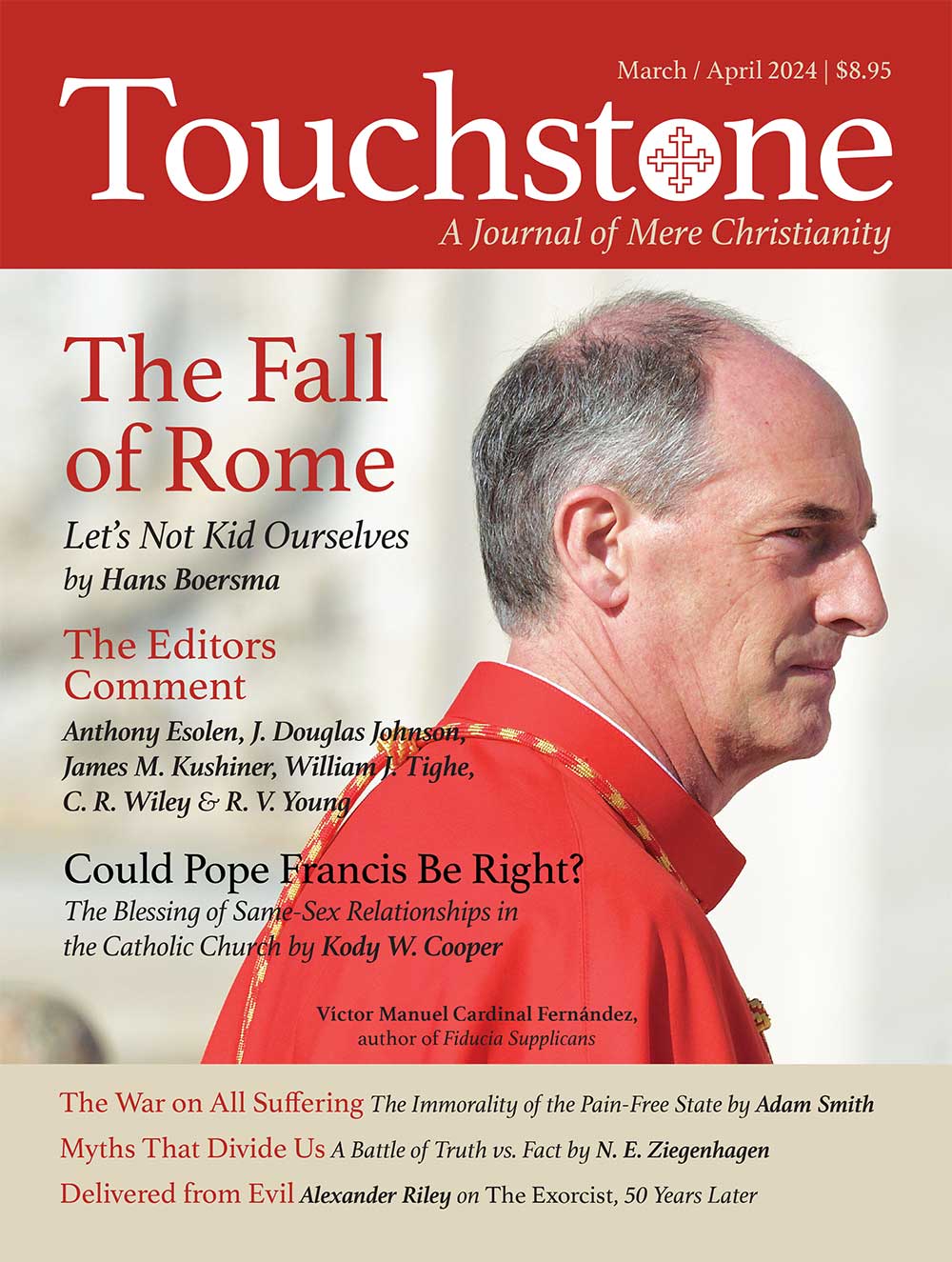Teaching Ecclesiastes
on the Hope of Smoke
Last May my wife and I watched our eldest son walk across the stage of John Carroll Catholic High School in Birmingham, Alabama. I felt like Reb Tevye: “Is this the same boy I taught to throw a baseball? When did all this growing up happen?” The whole experience was fun and joyous. The whole thing hurt, too. In these moments, the preacher of Ecclesiastes—Qoheleth—continues to haunt and help me. I could hear him saying throughout the graduation experience, “I told you so.”
“Hevel hevelim,” says Qoheleth, “All is hevel.” This well-known phrase, best known as “Vanity of vanities, all is vanity,” animates the whole of Ecclesiastes’ wisdom. Coming to terms with this phrase sets readers of the book on a trajectory of understanding and reception. To misunderstand hevel is to misunderstand the book. Translating hevel, however,remains tricky business. The word is a metaphor, and metaphors resist hard and fast denotations. They are associative by nature, calling on readers to make links between the image and an encyclopedia of experiences and knowledge that they carry around with them wittingly and unwittingly.
For example, take God is a rock. Well, no, God isn’t, but there must be something about “rockness” that might aid my understanding of God. Back we go to the verdant encyclopedia of our experiences and knowledge to forage around for some help: strength, stability, longevity. All these and more are rock-like qualities. They offer insight into the character of God and his self-giving. Far from distracting us from “the thing itself,” metaphors aid our understanding of it. In fact, we make sense of the world by metaphoric strategies all the time. The great preacher of Ecclesiastes wants his readers to understand the nature of human existence, life under the sun, as he calls it. What is the nature of life under the sun for Qoheleth? Hevel is the answer.
All Smoke
Several years back, I noticed a cigar butt in a lectern while lecturing at a seminary in Florida. It caught me by surprise because this isn’t the sort of thing you see in a seminary context, or at least not the ones I know. I asked someone at the seminary for the story behind the cigar. The week before my lectures, I was told, a well-known Old Testament scholar gave lessons on the biblical Wisdom literature. When Ecclesiastes rolled around—pun intended—the professor pulled a cigar from his pocket, lit its open face, and drew on it. The students must have thought this was pretty fantastic. Professors only have so many tricks up their sleeves, and this one ranks up there. Why did he do this? He was illustrating for the students the linguistic heartbeat of Ecclesiastes: hevel.
After the professor lit the cigar, he blew out a plume of smoke and pointed to it while it faded away into nothingness. While the students stared, the professor pronounced a single word: “hevel.” Exactly. Hevel signifies smoke or breath or wind. While hevel can serve several connotative purposes in the Old Testament, even describing the worthlessness of pursuing idols (Jer. 10:3), at its core it means breath, and smoke illustrates in material form what breath is. Qoheleth links our lives under the sun with the image of “smoke.”
Smoke, nothing but smoke. [That’s what the Quester says.]
There’s nothing to anything—it’s all smoke. (Eccl. 1:2—The Message)
Metaphors can lose something of their associative and fruitful character when a translation mutes the metaphor for a single interpretive conclusion. Study notes and commentaries make such moves for the sake of explanation and should do so. But translations do better when, if possible, the metaphors are left intact. “O my love is like a red, red rose” falls apart if “red, red rose” is replaced with “lovely” or “delicate” or “precious.” When the NIV settles on “meaningless” for hevel, it overexplains the metaphor and sets an interpretive trajectory for the whole book, running the real risk of limiting hevel’s metaphoric range. Read in these terms, the smoke of hevel illustrates the meaninglessness of human existence and leaves us there.
This reading strategy sets Ecclesiastes comfortably next to the despair literature of the early twentieth century. Kafka’s cockroach and Camus’s stranger nestle on each side of Ecclesiastes above the flickering fireplace of our humanity. Reading these three books together can make for a cold evening. Bring in the pessimist philosophical tradition of Schopenhauer and Nietzsche and coldness turns into a downright freeze. To read hevel as “meaningless” makes Qoheleth, Schopenhauer, and Nietzsche co-belligerents in their quest to shoulder-shake humanity into recognizing what Nietzsche calls the “nauseous” character of human existence.
These kinds of pessimistic reading strategies are readily on offer with our lugubrious Qoheleth. One such reading sees the whole of Ecclesiastes as pessimistic despair, with the last two verses of Ecclesiastes 12 functioning as a kind of slap across the face to snap us out of it: “Hey, forget all that nonsense and fear God.” This approach to the book is understandable. The dark clouds of Ecclesiastes loom large. Translating hevel as “meaningless,” however, allows a particular metaphoric association more determinative space than it should have. More than this, reading hevel in this way is a possible misapprehension, limiting hevel and the whole book to one dark path.
Hevel is smoke. Qoheleth clarifies it as a chasing after the wind (Eccl. 1:14). On the surface, wind, smoke, and breath bring some clear associations to our minds. When teaching Ecclesiastes, I ask the students to shout out ideas they associate with smoke as it might pertain to our lives. Ephemeral. Ungraspable. Unmanageable. Fleeting. It’s a good exercise because metaphors like “smoke” ignite the imagination, sending us to our experiences in search of data. The following three metaphoric associations may aid readers in their understanding of a challenging book like Ecclesiastes: Life is fleeting. Moments are ungraspable. Time remains unmanageable. Reb Tevye would agree: “Sunrise, sunset.”
Haunting & Helping
These associations between “smoke” and our lives are behind Qoheleth’s decision to accompany my wife and me to our son’s high-school graduation. If the Lord is kind enough to give us life, these haunting and hopeful truths will attend more graduations, perhaps some weddings, and other shared joys and sorrows that come with an ever-expanding family. Qoheleth would tell us to embrace all of these rich moments with the joy and confidence that come from knowing they are God’s gifts (Eccl. 2:24–26; 5:18–20). Reading Ecclesiastes well requires us to hold complex truths together, resisting our tendency to settle on one facet of the book over the other. Thus, the book haunts and helps, both at the same time.
Ecclesiastes haunts because Qoheleth paints an honest picture of human existence, a picture whose negative spaces are all too familiar for breathing bipeds like us. Our lives and the moments they contain are fleeting and ungraspable in both a temporal and existential sense. They cannot be tamed and managed or stored up in a bottle for future use, despite the three million pictures on our phones. The pictures themselves bear witness to this truth. After looking through some photos recently of an earlier iteration of our family, my wife looked at me and said, “It hurts.”
Qoheleth does not sugarcoat the hevel character of our existence. If Ecclesiastes only haunted us, then Qoheleth and Schopenhauer would share much in common. Life is suffering because of the nature of our desires, our Wille. We want what we do not have, and this wanting is a species of suffering. Once we attain what we want, rarely does the object of our desire live up to its billing, or it slips through our fingers once again. This, too, is a kind of human suffering. Welcome to the vortex of human despair á la Schopenhauer and a reductionist reading of Qoheleth.
Unlike Schopenhauer, however, Qoheleth not only haunts us; he helps us. As surprising as this may sound, Ecclesiastes brims with hope. Qoheleth reminds us that, yes, life is fleeting. Its moments cannot be grasped and contained. They are like smoke. Time moves us all along the bending arc of our lives in a tyrannical manner. Hard as these truths are, a kindness is hidden within them. Unreflective people are in for a shock when life becomes more rear-view mirror than open road. Qoheleth helps reduce this shock for those willing to hear.
At the same time, Qoheleth drives us back to the goods of this world, back to the very things he seems to take from us: wisdom, pleasure, and the work of our hands. Qoheleth also leaves us with God, such that our embrace of the goods of our human existence becomes instruments by which God is enjoyed and our future with him as our ultimate good becomes clearer (Eccl. 12). Augustine’s ordered desires and Qoheleth’s sage counsel make for spiritually healthy road companions for the faithful traveler. Hevel without God in the world is despair. Hevel with God in the world rightly orders our desires and keeps the summum bonum in view as moments in time slip through our fingers. Can there be any more helpful and hopeful counsel for wayfaring pilgrims making their way through this life under the sun?
A Physical Ache, a Glittering Hope
My wife and I sat in those uncomfortable gymnasium bleachers and watched our firstborn move across the platform: with his wispy green regalia and academic cap set toward the back of his head in a way only a teenage boy can pull off. We smiled; we winced. Reb Tevye sang. Thankfully, Qoheleth’s sage counsel was there with us as well. These moments are joyous. They also bring with them a physical ache. They testify to the hevel hevelim of life under the sun. Buried in the ache of these moments rests a glittering hope. Hevel also tells us we’ve been made for more, much more, and fills us with the hope of life now and forever more.
Mark Gignilliat is a professor of divinity at Beeson Divinity School, Samford University. He also serves as the director of Beeson’s newly launched Ph.D. program in Theology for the Church and as theologian-in-residence at St. Peter’s Anglican Church in Birmingham, Alabama.
subscription options
Order
Print/Online Subscription

Get six issues (one year) of Touchstone PLUS full online access including pdf downloads for only $39.95. That's only $3.34 per month!
Order
Online Only
Subscription

Get a one-year full-access subscription to the Touchstone online archives for only $19.95. That's only $1.66 per month!
bulk subscriptions
Order Touchstone subscriptions in bulk and save $10 per sub! Each subscription includes 6 issues of Touchstone plus full online access to touchstonemag.com—including archives, videos, and pdf downloads of recent issues for only $29.95 each! Great for churches or study groups.
Transactions will be processed on a secure server.
more from the online archives
calling all readers
Please Donate
"There are magazines worth reading but few worth saving . . . Touchstone is just such a magazine."
—Alice von Hildebrand
"Here we do not concede one square millimeter of territory to falsehood, folly, contemporary sentimentality, or fashion. We speak the truth, and let God be our judge. . . . Touchstone is the one committedly Christian conservative journal."
—Anthony Esolen, Touchstone senior editor










